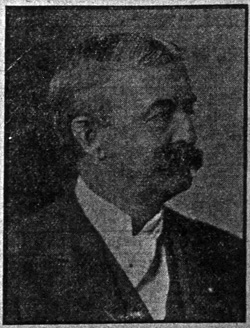The Sioux City Journal, September 12, 1901 (Photo of Civil War veteran)



The Sioux City Journal, September 12, 1901
THE BOYS IN BLUE OF ‘61
CAPT. T. P. GERE
“I saw an incident,” said Capt. T. P. Gere, when asked for an anecdote relating to his army service, “which though not in itself of especial consequence, is notable in that it concerned the two most prominent commanders in the union army.
“We, the Fifth Minnesota, were in Gen. Grant’s army during the Vicksburg campaign, in the army corps then commanded by Gen. W. T. Sherman, ‘the old Fifteenth.’ When Pemberton was at length behind his works encircling the city, the Fifteenth army, being posted in the locality known as Walnut Hills. The line of battle in our front occupied the crest of a high, sharp and wooded ridge, trending eastwardly and separated from the confederate entrenchments on a similar ridge by a deep ravine into which countless branches of fallen trees were interlaced into a gigantic and well nigh impassable abatis.
“After the memorable unsuccessful attempt to carry the confederate line by assault on the 22d day of May, 1863, we found ourselves again in our bivouac just behind the top of our ridge. The slope of the ridge occupied by us was broken by several quite steep ravines heading near the summit and falling northward, and the position of our regiment was along the west face of one of these. Gen. Sherman’s headquarters (consisting of little besides a tent fly and two or three camp chests) were almost directly opposite to us across the depression, perhaps 200 feet distant, in a little space between surrounding trees and in the shade of their giant branches.
“At about noon of the day after the assault, I was lying on the hillside wondering what next we would have to do and looking across at Gen. Sherman’s little nook, when I saw Gen. Grant with three or four of his staff ride up to Sherman and dismount. The camp chests had been opened and the lunch spread on the tables thus improvised, and shortly the party became seated in most unconventional style, while a discussion of evident interest was progressing. It was, to say the least, interesting to a youthful soldier to see in conference thus near the two men in whose hands he was sure rested his early weal or woe.
“But here is the incident. All this time a lively artillery duel was in progress between the batteries on the ridges. The Johnnies had some good guns in position, and their shots were just grazing the top of our ridge. Grant and Sherman were seated perhaps fifty feet lower than the summit, but the forest kings reached much above. The repast had been in progress perhaps five minutes when a shot from one of the big guns came over, just cleared the ridge, struck and cut off a heavy limb of the tree under which our generals were sitting, and down came the limb, nearly as large as your body, not over ten feet from their heads.
“I was not near enough to hear what was said. There was a temporary scattering amongst the orderlies. I thought I could see a quizzical expression on the bronzed faces of the commanders, but evidently they concluded that the shot could not be duplicated, for the repast was quietly continued and concluded without further interruption.
“It isn’t much of a story, but I have sometimes thought that a slight variation in the fall of that big limb might have changed several pages of history.”



